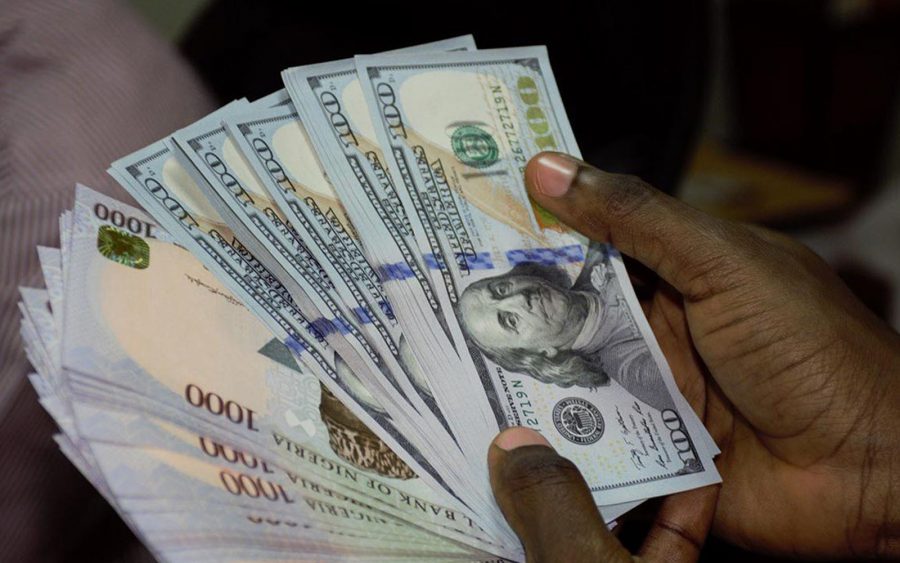The exchange rate at the parallel market fell to another new 3-year low on Friday closing at N465/$1. However, on the officially recognized NAFEX Market, the Forex turnover was somewhat stable with only a slight drop of 0.08% on Friday as the exchange rate was weakened to N387/$1.
Parallel Market: At the black market where forex is traded unofficially, the Naira depreciated by N2 to a dollar to close at N465 to a dollar on Friday, as against the N463 to a dollar on Thursday, another new 3-year low for the Naira. The exchange rate at the beginning of the week was N461 to a dollar. The drop is due to pressure on the black market as a result of scarcity of dollars, especially at the official. This has made most businesses to source for their foreign exchange at the black market.
NAFEX: The Naira depreciated against the dollar at the Investors and Exporters (I&E) window on Friday, closing at N387 to a dollar, compared to the N386.50 that was reported on Thursday, July 9, representing a 50 kobo drop. This is as traders are still confused over CBN’s adjustment of the exchange rate at the SMIS window. The opening indicative rate was N386.13 to a dollar on Friday. This represents an 83 kobo gain when compared to the N386.96 to a dollar that was recorded on Thursday.
READ MORE: World Bank says Nigerian banks are at risk of being destabilised by COVID-19
Nigeria maintains multiple exchange rates comprising the CBN official rate, the BDC rates, SMIS, and the NAFEX (I&E window). Nairametrics reported last week that the government has set plans in motion to unify the multiple exchange rates in line with requirements from the World Bank. Nigeria is seeking a world bank loan of up to $3 billion. The country has been under pressure from the International Monetary Fund and the World Bank for currency reforms.
Forex Turnover
Meanwhile, forex turnover at the Investor and Exporters (I&E) window was somewhat stable on Friday, July 10, 2020, as it dropped by an insignificant 0.08% a day on day. According to the data tracked by Nairametrics, forex turnover slightly dropped from $25.19 million on Thursday, July 9, 2020, to $25.17 million on Friday, July 10, 2020. The low turnover is an indication of the liquidity pressure in the foreign exchange market and a far cry from an average of $200 million recorded at major trading days during the last few weeks.
Rate Adjustment
Nairametrics reported last week that the CBN official rate has been adjusted from N360 to a dollar to N381 as reflected on the website of the FMDQ. However, the confusion in the forex market still persists as official rate quoted on the website of the CBN remains at N360/$1.
According to Bloomberg, “Nigeria quietly devalued its official exchange rate last week, a nod to IMF suggestions that foreign investors would appreciate the unification of a currency that has traded at multiple rates for five years. In the event, the handling of the 5.5% devaluation of N381 per dollar still served to sow confusion. The Central bank hasn’t announced the change and is yet to adjust the rate on its website.’’
READ MORE: Analysts predict outlook for naira as forex unification plans gain momentum
What this means: Unifying the Naira around the NAFEX rate is effectively another round of devaluation. If this is carried out and forex liquidity improves, then it could lead to an exchange rate being strengthened in the parallel market just like it occurred in 2017.
The parallel market rate is currently N465/$1 and could converge to the NAFEX rate, meaning those who bought above the black market rate could lose money if they sell.
The country’s monetary authority had imposed multiple exchange rates to manage dollar demand after oil prices crashed, but dollar shortages which have become prevalent stifles growth in the economy.
According to a report from Nairametrics, the Manufacturers Association of Nigeria (MAN), has expressed its support to the recent CBN’s exchange rate unification drive. They said that this will boost investor confidence and enable stable planned production for the manufacturers thereby leading to economic growth in the country.
This, however, contradicts the views of the Nigeria Employers’ Consultative Association (NECA), who does not support the exchange rate adjustment at the SMIS window as it will lead to inflation. They believe that the rate adjustment is badly timed and counterproductive, as the nation depends a lot on importation of raw materials, equipment and petroleum products. This will lead to higher cost of all imported goods.



















